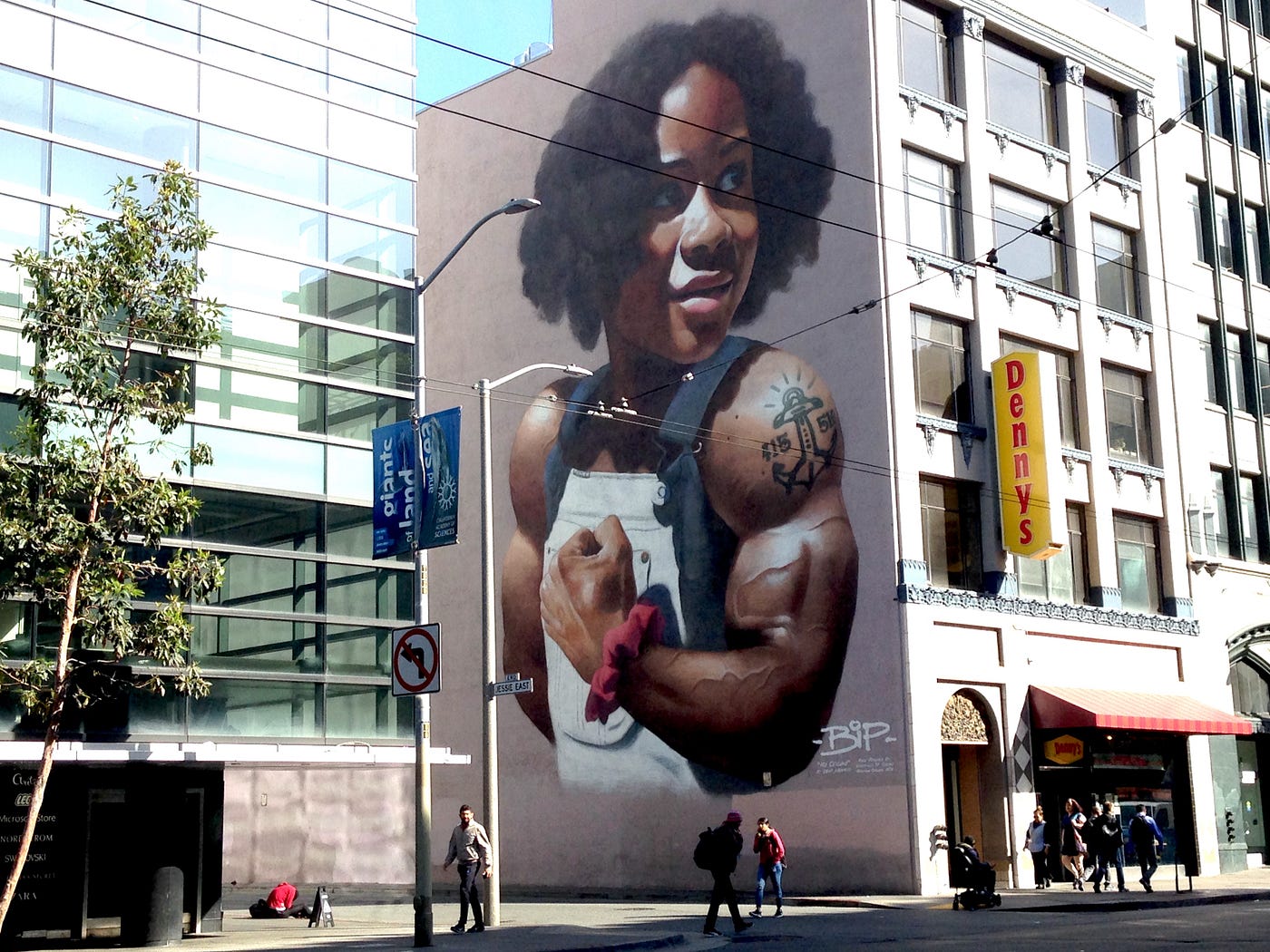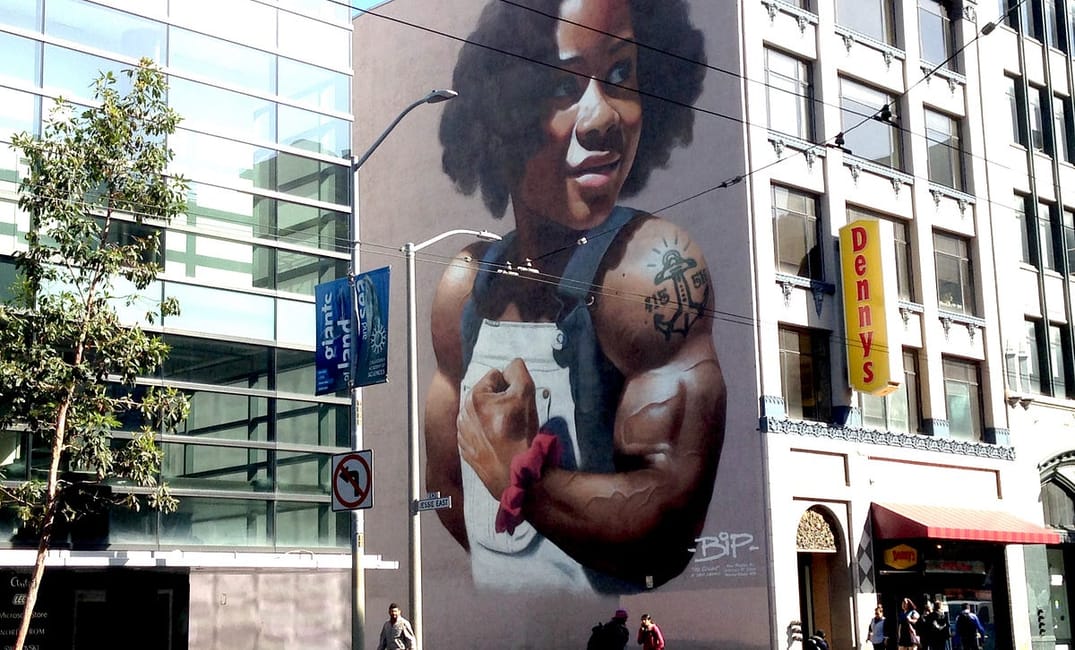
As you can see from my picture, I’m white. I grew up in an all-white neighborhood in Stockton and went to an almost-all-white high school there. Now I live in mostly white San Francisco (less than 5 percent African American, at last count). And because I have almost zero interaction with black people, I sometimes fall prey to unconscious racism. That’s shameful but not uncommon.
If you’re white and don’t want to be racist, you have to take deliberate action to root out the rot.
Here’s something that happened to me recently: a black family showed up to my walking tour of North Beach, and as I approached them, I felt my heart rate increase. That’s ugly but true. What I did to combat my unconscious racism in that moment was to scream “Stop that!” internally. “You’re the same!” I thought-shouted at my stupid reaction. Then I slapped myself—hard—in my imagination.
That’s what all those white “Barbecue Beckys” should have done last year instead of calling the police because they somehow felt threatened by black people going about their lives. It’s what men should do before catcalling (or being condescending to) women. And it’s absolutely what police should be doing before pulling out their handcuffs and tasers and guns.
But this story isn’t about blatant racism or the horrific loss of life and freedom protested by the Black Lives Matter movement—a gross injustice we all must fight. It’s about the smaller, more subtle insults that allies of “others” must first notice and then work to erase.
Most San Franciscans are proud of our all-inclusive reputation. A majority of voters chose a black woman mayor in London Breed. […] But the sad truth is that sometimes white people in California don’t even know when they’re being racist.
I started thinking about racism after reading this story in The Bold Italic, written by a young black woman living in San Francisco. Kimberly Reyes had long dreamed of moving here. But achieving her dream has been a disappointment, and not because the rents are too high or because the streets are full of homeless people. Reyes has a good job, a good income, a good place to live and so on. The dream disappoints because of the racism that she encounters in this most liberal of liberal West Coast cities.
Reyes’s story upset me, as did the comments beneath it, where black readers described the insults they’d endured here. I don’t want one more black person to abandon San Francisco. Already, I’m distressed by its homogeneity. And it’s not because I’m a good person. I don’t only want to stop racism because it’s the right thing to do for other people; I also want to stop it for my own benefit. Because I suffer when all my neighbors look the same. And I suffer when I ignore corruptive rot in my soul.
Let someone smarter than I am break it down.
Most San Franciscans are proud of our all-inclusive reputation. A majority of voters chose a black woman mayor in London Breed. That promise of welcome and community is what drew Reyes here from the East Coast. But the sad truth is that sometimes white people in California don’t even know when they’re being racist.
I still remember an interview I did when working as a writer for a Peninsula hospital 30 years ago. I’m not sure what I asked the older black man I was writing about, but I don’t doubt it was offensive, because halfway through our meeting, it dawned on me that he was tired of educating clueless rubes like me that all black neighborhoods aren’t rife with drug dealers and criminals, like we see on TV.
I remember vividly that he told me that, sadly, he was considering moving back to the South, where, sure — the racism is overt, but at least he could see it coming. In the South, at least he knew what to expect, unlike in California. That always stuck with me.
Creator Terence Nance confronts clueless racism in this sketch from his brilliant and completely original HBO series Random Acts of Flyness. All eight episodes are required viewing for lovers of art interested in issues of racism, sexism, homophobia, Islamophobia and other irrational fears of the unknown.
When it comes to clueless racism, even smart people suffer from it. I doubt that Bill Moyers knew he was being racist when he asked Toni Morrison if she’d ever write novels about white people. If you’d like to see her unpack that question and gently school Charlie Rose (also embarrassingly clueless), watch this.
And I can’t tell if this guy knew he was being racist when he asked Dr. Martin Luther King Jr. why other minorities had done better than blacks in the US. He must have known, right? Yet he seems unashamed.
Besides accidental racists, there are people who are deliberately and defiantly so, although according to San Francisco’s reputation, you won’t find them here. For those people, I recommend education. Try reading “Why Race Is Not a Thing, According to Genetics” in National Geographic or “How Science and Genetics Are Reshaping the Race Debate in the 21st Century” at Harvard.edu. Better yet, if you really want to get your head on straight, try tackling this long and extensively researched essay by Ta-Nehisi Coates about why the US should pay reparations to the descendants of slaves.
That means — yes — progressive, liberal white San Francisco hipsters can and do still hold unconscious bias toward groups outside of their own.
Did you know that Representative John Conyers Jr., who served the Detroit area for more than 50 years before stepping down in 2017 amid allegations of sexual harassment (because nothing is simple), introduced a bill to study reparations at the start of every Congress during his last 28 years?
No money was allocated. No conclusions foregone. Yet Congress declined to even study the matter for 28 years straight. Why is that, do you think? I, for one, would welcome a chance to expiate what some call America’s “original sin.” Maybe then some real progress toward a just society could begin.
When I showed a draft of this story to a friend who’s a teacher, she sent me some training materials that they use at her Peninsula high school that explain how people are unconsciously biased in favor of the group they belong to (via race, gender, sexual orientation, etc.) or toward the “culturally valued group,” even if that bias is in opposition to their stated beliefs. That means—yes—progressive, liberal white San Francisco hipsters can and do still hold unconscious bias toward groups outside of their own.
I’m watching, San Francisco. I’m struggling with those questions. Because I want this city to be safe and welcoming for all kinds of people, as advertised.
The remedy to this? Pay attention. You must notice your unconscious bias in the first place in order to put a stop to it in the second. Often, that means slapping yourself in your mind. In the third place, we all must work to build empathy for people unlike us. But how can white San Franciscans build empathy for African Americans when the black population is disappearing here?
After reading and getting riled up by Reyes’s story, I was driving down Folsom Street when I saw a disturbing sight. A black man in dreadlocks was sitting on the ground with his legs stretched out in front of him and his hands behind his back, surrounded by three standing police officers, while another police car raced up with its lights flashing. A second black man stood watching from half a block away, his mouth stretched open in a grimace.
I wanted to pull over and check what was going on or maybe pull out my phone and start filming, but I didn’t know if that would make things better or worse, if the man on the ground would feel supported or ashamed, or if the police would escalate or calm down. I didn’t want to be a deluded “white savior.” And I’m afraid of guns.
As it turned out, there was no place to pull over, and I was late, so I just drove by. Maybe that was for the best. Maybe not. I don’t know.
But I’m watching, San Francisco. I’m struggling with those questions. Because I want this city to be safe and welcoming for all kinds of people, as advertised. I want this city (and by “this city,” I mean this whole gd country) to do better by its people — for me, for Kimberly Reyes, for everyone.
So come on, San Francisco. Wake up.
My writing is always free to readers who follow my links from Twitter, Facebook, and LinkedIn, but if you’d like to browse more, click here to join Medium and help support my work at the same time. Want an email when I publish a new story? Click here. And for more of the good stuff, follow Fourth Wave, where we’re changing the world for the better, one story at a time. Got one of your own? Submit to the Wave!







